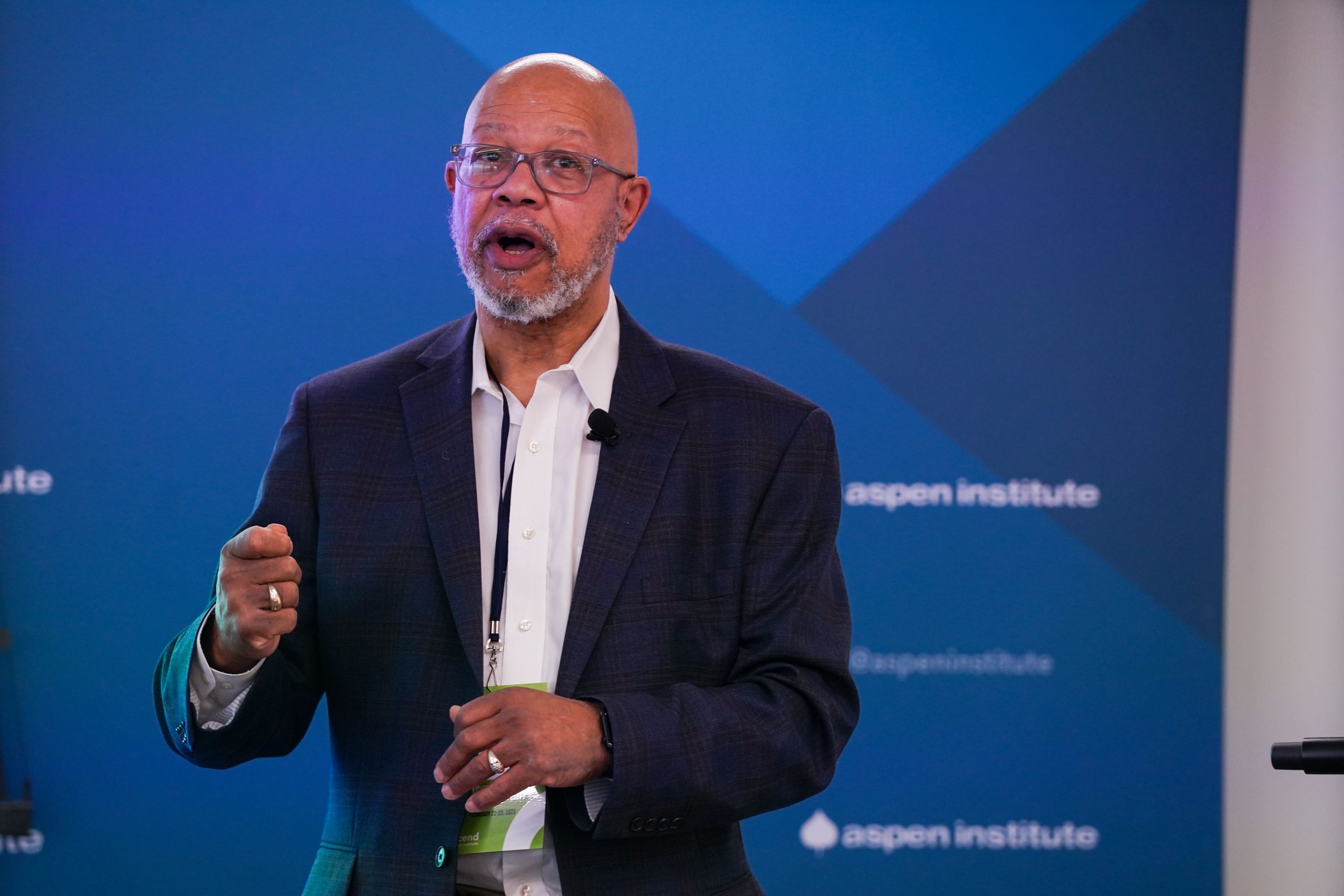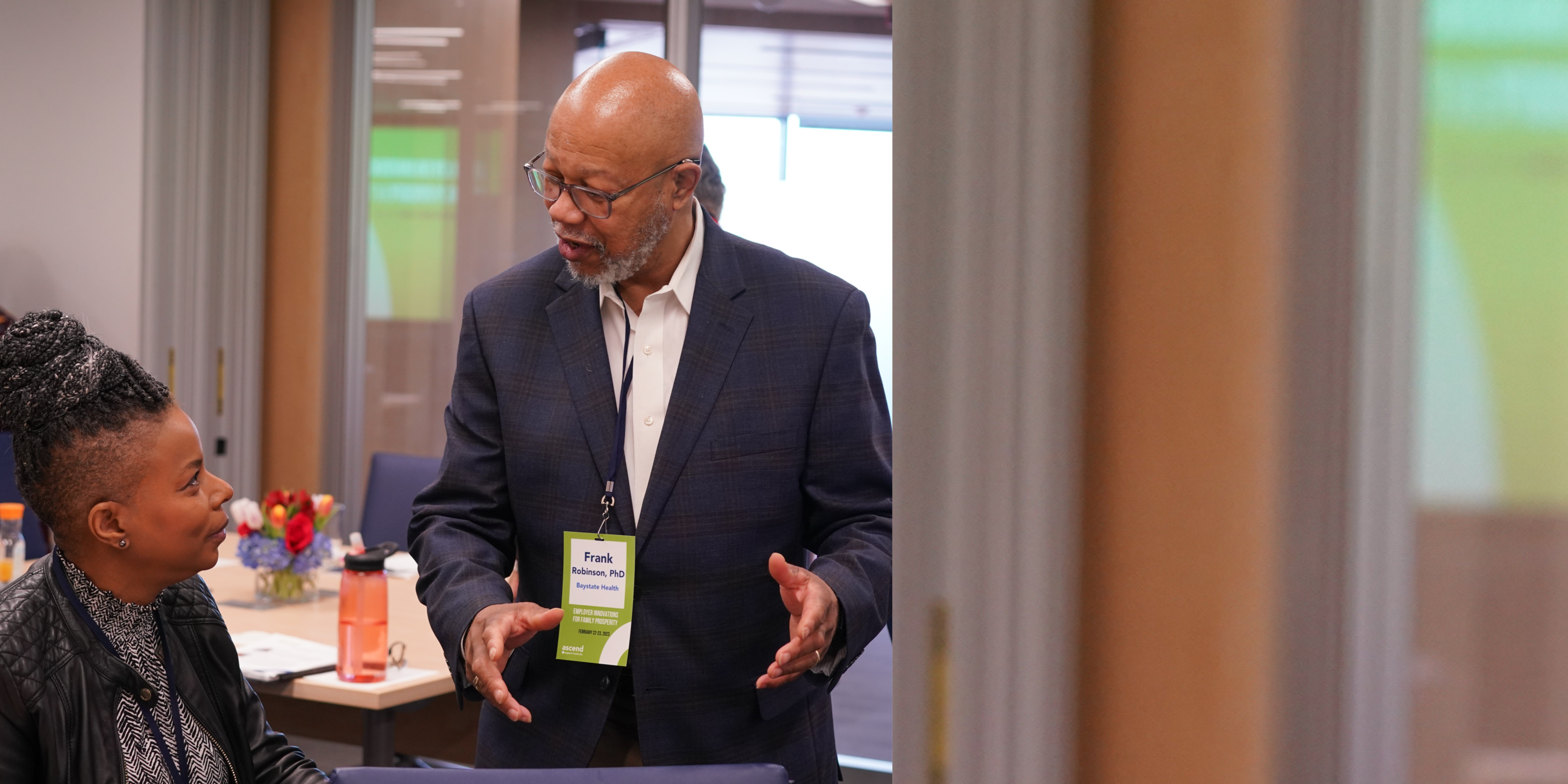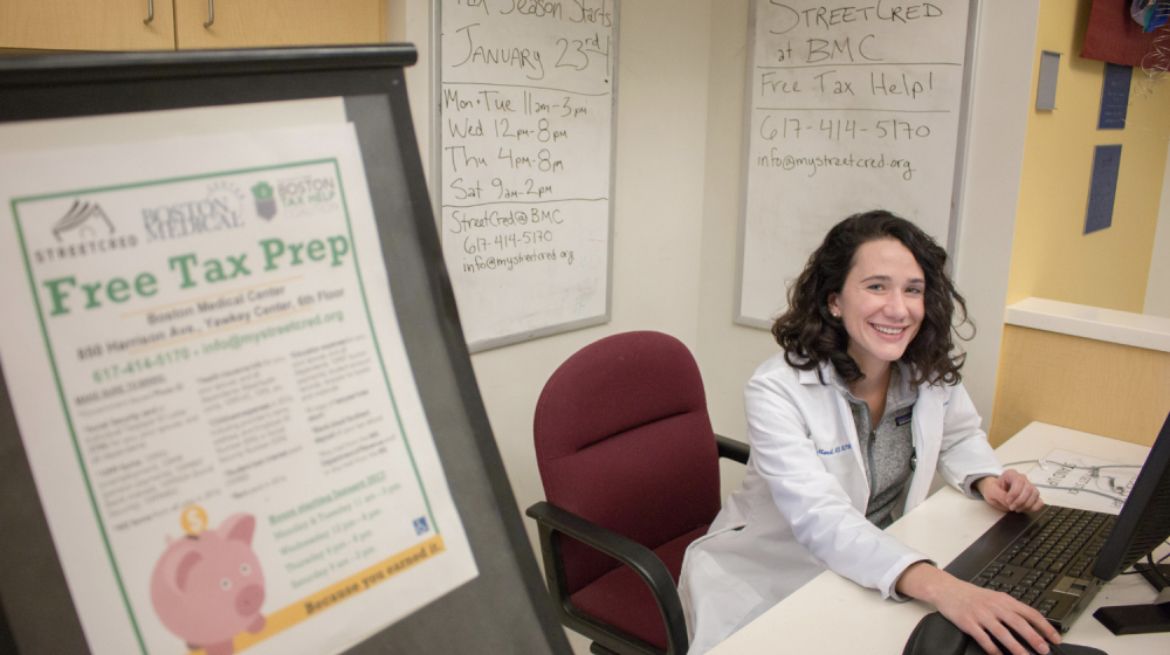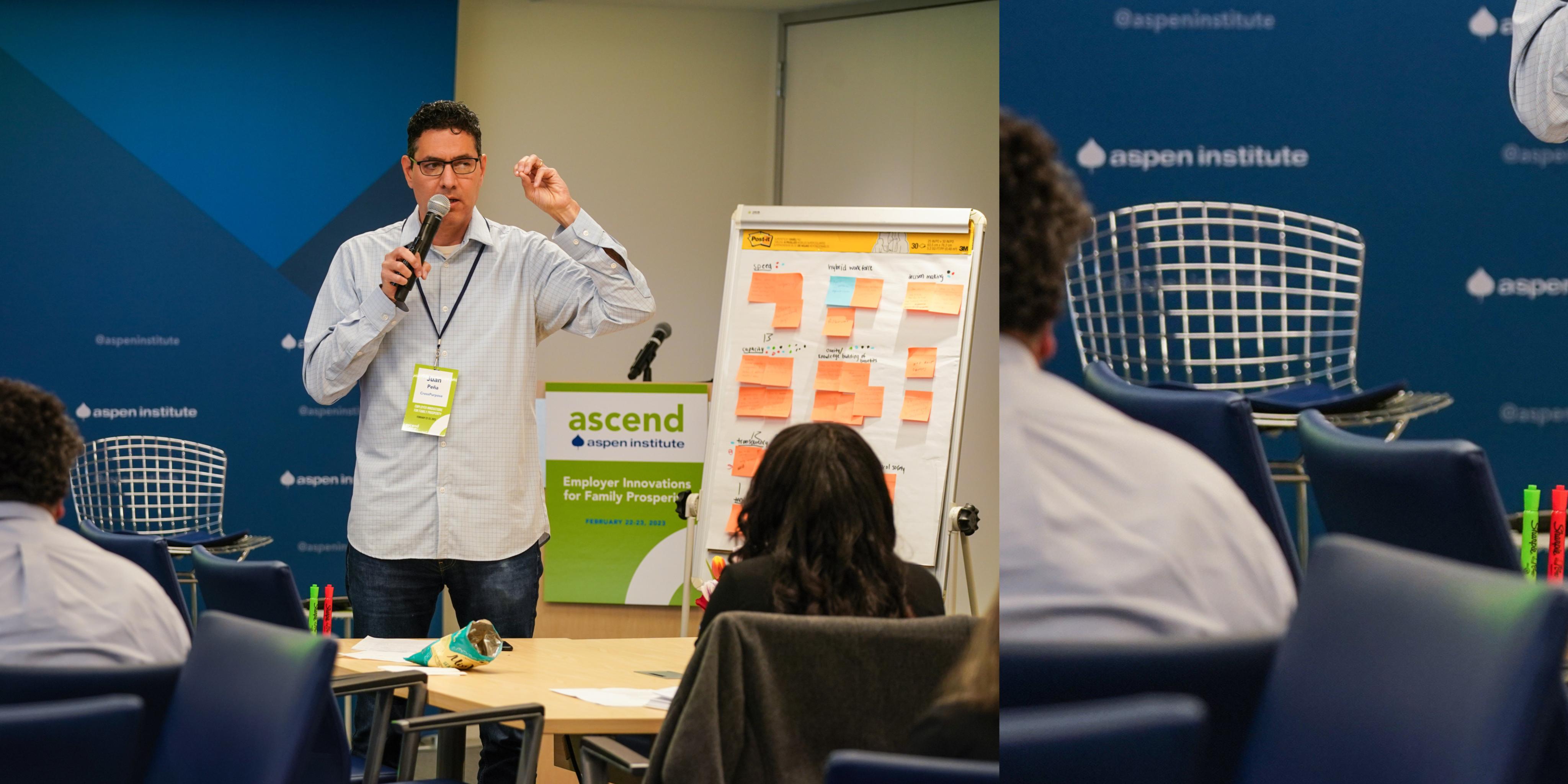Unleashing Family Prosperity Through Innovation
Family Prosperity Phase II surfaced innovations in elevating parent and caregiver voice, systems-level approaches to eliminating benefits cliffs, and game-changing models within hospital systems to strengthen economic stability as well as improve health outcomes for families.

Elevating Parents and Caregivers as Experts
Ascend values the lived experiences and expertise of families in the development of policy and practice recommendations. By centering the voices and recommendations of those most impacted by cracks in our systems, policymakers and practitioners are better equipped to design policies and programs that support families, meet community needs, and remove existing barriers faced by working parents and caregivers.
Accordingly, Ascend and our Family Prosperity Partners engaged 18 parent and caregiving leaders as experts throughout Phase II. Parent leaders were nominated by Partners to participate in the multi-day convenings, share their insights on reports and parent resources, and inform Family Prosperity’s strategies and priorities.
















Dwayne Meeks, Colorado Department of Human Services
Dwayne Meeks, Colorado Department of Human Services

Kimberly Mitchell, Jobs With Justice
Kimberly Mitchell, Jobs With Justice

Charnae Easton, Legal Aid at Work
Charnae Easton, Legal Aid at Work

George Davis V, Colorado Department of Human Services
George Davis V, Colorado Department of Human Services

Kevin Ryder, Colorado Department of Human Services
Kevin Ryder, Colorado Department of Human Services

Yesenia Valentin, StreetCred at Boston Medical Center
Yesenia Valentin, StreetCred at Boston Medical Center

Carolina Salas, Partnership for Community Action
Carolina Salas, Partnership for Community Action

Nadia Inzunza, Partnership for Community Action
Nadia Inzunza, Partnership for Community Action

Jaqueline Monsanto, All Our Kin
Jaqueline Monsanto, All Our Kin

Sequaya Coleman, Springboard To Opportunities
Sequaya Coleman, Springboard To Opportunities

Miggz Trussell, UTEC
Miggz Trussell, UTEC

Elizabeth Newton, Colorado Department of Human Services
Elizabeth Newton, Colorado Department of Human Services

Veronica Avalos, Partnership for Community Action
Veronica Avalos, Partnership for Community Action

Evelyn Ramos, Partnership for Community Action
Evelyn Ramos, Partnership for Community Action

Rebecca Flores, Activate Work
Rebecca Flores, Activate Work
Innovations in Elevating Parent Voices
Each Family Prosperity Partner champions a unique approach to engaging parents, and these powerful innovations can potentially shift practice and policy by ensuring that parent experiences and solutions reach decision-makers.
Parent Councils and Policy Committees
- The Colorado Department of Human Services (CDHS) organized the Family Voice Council in 2018 to improve quality and service delivery to Coloradans. In monthly meetings, parents, caregivers, and community members are invited to share their lived expertise with administrators and policymakers. Council members are offered child care, transportation reimbursement, and stipends for their time and insights. CDHS recently released the Family Voice Compass, a tool that includes a robust set of resources for organizations looking to develop their own council.
- By focusing on education, economic sustainability, health equity, and immigrant rights, Partnership for Community Action (PCA) works to build strong, healthy communities in Albuquerque’s South Valley and across New Mexico. PCA's Council Plan focuses on engaging community leaders to take action on the issues that most affect their lives and overcome barriers, including language accessibility and equity in information sharing. The council is made up of multiple committees that offer community-led solutions that inform the organization's policy direction.
Co-Development of Tools & Assessments
- To inform the development of its Family Success Plan, Family and Workforce Centers of America (FWCA) established an advisory committee of clients who participate in coaching sessions and use the tool to set educational, health, and family goals. Advisory committee members were asked to provide feedback on the tool’s goal and design. Informed by the families’ feedback, the tool has been adopted as a key element of FWCA’s Missouri-based coaching and case management services.
- Springboard To Opportunities in Jackson, Mississippi, partnered with residents to develop a culturally relevant toolkit and curriculum that supports Black mothers with low incomes in developing self-care routines with an emphasis on community support and healing. Two Springboard residents received training to facilitate the four-week program that accompanies the toolkit.
Focus Groups and Interviews
- In partnership with Allegheny County Department of Human Services (ACDHS), Partner4Work conducted four virtual focus groups in March 2021 to better understand the barriers working parents face. Seventeen participants were actively recruited from the EARN and Work Ready programs as well as ACDHS Family Center, Head Start, and child care subsidy programs.
- The StreetCred program, embedded within the Boston Medical Center Department of Pediatrics, provides clinic-based tax preparation, enrollment in college savings accounts, and employment services for families of pediatric patients. In 2021, StreetCred conducted interviews with 11 participants in its financial coaching program to gauge efficacy, expectations, and feasibility of services.
Community Touch Points
- Agape Child & Family Services in Memphis, Tennessee, hosts a Community Cafe series with community members to assess their current priorities, concerns, and desires related to Agape’s services. This method is a pillar in the organization’s “voice and choice” model, which aims to lift up community voice to adapt services and policy priorities to fill gaps for families.
- Legal Aid at Work and All Our Kin partner with their local Special Supplemental Nutrition Program for Women, Infants and Children (WIC) offices to expand direct services to families. The proximity and accessibility of their services within the WIC office have provided critical information and supports for parents like Charnae Easton. In 2018, Charnae’s employer, the U.S. Postal Service (USPS), harassed and discriminated against her for exercising her lactation rights while on the job. She came to the WIC office looking for help and was introduced to the team at Legal Aid at Work. After bringing a case against the Postal Service, Charnae settled in February 2021, and significant policy change spanning several postal districts in California has gone into effect that allows nursing and expecting people to fully exercise their rights as caregivers and federal employees.
Hospitals as Community Anchors
An impactful component of Phase II was the inclusion of three nonprofit hospitals as Action and Innovation Partners. Baystate Health, StreetCred at Boston Medical Center, and Nationwide Children’s Hospital are strong models of health systems strategically partnering with communities to address the economic barriers impacting patient health outcomes. As leaders of large health systems — Atrium Health and Maryland Capital Region Health — Family Prosperity Advisors Jennifer Sullivan, MD, and Joseph Wright, MD, contributed thoughtful insights on the potential of health systems as key drivers toward family prosperity.
Making Caregiving and Breadwinning Compatible at Baystate Health
Innovation
As a leading employer in Springfield, Massachusetts, Baystate Health leverages its economic output through three pillars: local hiring, local sourcing, and place-based investing. As an employer of hundreds of frontline health care professionals, Baystate conducted an internal assessment of employee compensation, benefits uptake, access to professional development, and barriers in policy that impact the well-being of their working families. This undertaking led it to partner with community-based and workforce development organizations, Parent Villages and Springfield WORKS, to develop a suite of resources for the current and developing pipeline of employees.
Result
In 2021, Baystate recognized that 10 critical roles represented more than 50 percent of its more than 1,850 job openings, and more than 50 percent of employee turnover came from four hourly wage employment categories. Based on what it learned participating in Family Prosperity, Baystate recognized that compensation alone was an insufficient recruitment and retention strategy — particularly since these critical and high-turnover roles were typically held by parenting and caregiving Black and brown employees.
To address these issues, Baystate partnered with Holyoke Community College to create a workplace-based training program, or pay-to-train model, to upskill incumbent employees and simultaneously enroll community candidates. By extending their onboarding and compensating trainees, the cohort automatically entered a career development and advancement pathway as an employee of Baystate.
Upshot
By enacting specific and measurable workplace innovations, hospital systems can improve economic outcomes for a large workforce. A majority of these employees have low incomes and/or move between income status due to unstable wages and schedules. These innovations include offering same-day pay for new employees seeking to accrue savings during job transitions; increasing apprenticeships for workers; deepening analysis of uptake on benefits to understand where there are gaps in access and education; and providing stackable credential training to nursing and technical staff seeking to increase wages.


Medical Financial Partnerships with StreetCred at Boston Medical Center
Innovation
The financial coaching program at StreetCred at Boston Medical Center is one of only two programs in the country that combines financial coaching with a pediatric clinic. StreetCred emphasizes the innovative role medical financial partnerships (MFPs) can play in the economic mobility and health of families. StreetCred has developed an Economic Bundle for patients that includes tax preparation, enrollment in college savings accounts, and employment opportunity services.
Lucy Marcil, MD, Ascend Fellow and executive director of StreetCred, co-authored “Medical–Financial Partnerships — Beyond Traditional Boundaries” detailing the relationship between poor health outcomes and financial status. The article, published in the New England Journal of Medicine, emphasizes that health care systems have the opportunity to impact both factors through MFPs, which may include financial coaching and assistance in establishing savings accounts, filing taxes, and building credit.
Result
By partnering with United Way, StreetCred provided financial coaching to 200 families between November 2020 and September 2021. Notably, 20 families opened 529 college savings accounts during that time. A 529 college savings account can have long-term effects on a family’s financial future. Data shows these accounts triple the likelihood of a child attending college and quadruple the likelihood of graduating from college. These accounts have also been associated with improved maternal mood and social-emotional development of children.
Upshot
Nationally, less than 3 percent of families have 529 savings accounts, and those families tend to be white and wealthy. In contrast, StreedCred families earn an average of $21,600 a year, and many identify as either Black/African American or mixed race, and half identify as Hispanic/Latino. Medical financial partnerships may be a key mechanism in reducing racial and ethnic inequities in access to financial assets and wealth building.

Resident-Driven Community Investments at Nationwide Children’s Hospital
Innovation
Nationwide Children’s Hospital’s (NCH) Healthy Neighborhoods Healthy Families (HNHF) strives to expand NCH’s commitment to the health and well-being of all children and families. Working with Cohear, HNHF held discussions with residents in Linden, Ohio, that would inform the hospital's role in promoting community health and affordable housing development. HNHF and Cohear facilitated a series of five discussions with over 40 residents on the topics of health and wellness, youth success, workforce development, and access to housing.
Result
HNHF expanded its My Bridge 2 Success program, which promotes economic stability for Linden residents through mentorship and financial planning services. In 2022, HNHF served 521 families by hosting tax clinics at Nationwide Primary Care Centers throughout Linden, Ohio, and partnering with community partners to host additional sites. On average, families claimed $5,269 in child tax credits and $1,967 in earned income tax credits. Overall these clinics facilitated state and federal tax refunds totaling $1,412,108 for Linden families in 2022.
Utilizing the Mobility Mentoring Model of Economic Mobility Pathways (EMpath), the hospital also provides both internal staff and community members with economic mobility coaching. As of early 2023 the hospital has funded and facilitated mentorship training for over 30 local organizations to increase accessibility and instill a common language among institutions and stakeholders around economic security and prosperity.
Upshot
Children’s hospitals and/or pediatric units represent a powerful platform from which to educate, support, and engage parents and caregivers in their own well-being and security (supporting a two-generation, or 2Gen, approach). StreetCred at Boston Medical Center and the tax preparation site within Nationwide Children’s Hospital facilitated record numbers of completed tax returns in 2022, returning thousands of dollars to parents of children treated within the hospital system.

Prosperity and The Benefits Cliff
Family Prosperity partners recognized the benefits cliff as a major barrier to economic mobility and security for caregiving workers. The opportunity for increased wages often results in a benefits cliff, disqualifying families from receiving critical support, including Supplemental Nutrition Assistance Program (SNAP), Temporary Assistance for Needy Families (TANF), health care coverage, child care assistance, and housing and transportation subsidies, among others. To tackle this issue, partners worked with state policymakers to amend policy, launch state-level pilots, and develop tools for families to plan for — and avoid — cliffs.
A New Colorado Child Care Assistance Program Policy
Innovation
CrossPurpose and its partners identified a flaw in the Colorado Child Care Assistance Program (CCCAP): as family income increased to between 100 and 130 percent of the federal poverty level (FPL), parent copays increased dramatically, creating a steep cliff for parents and caregivers. Working closely with the Office of Early Education, CrossPurpose set a goal to develop an amended policy that would keep copays below 10 percent of household income.
CrossPurpose organized the CCCAP Parent Work Group and conducted listening sessions with families to gauge their experience and concerns with the program. Affordability was a significant concern for them. CrossPurpose prepared four marginal-rate models illustrating three different financial situations families encountered. These models were reviewed by leaders in three counties, representative of most counties in Colorado, and the Parent Work Group.
Upshot
CrossPurpose determined a marginal rate that would achieve its goal of keeping overall costs for families below 10 percent of household income until families are above 300 percent of the FPL. The new CCCAP policy was implemented on July 1, 2021. The CCCAP policy change exemplifies the power of lifting the voices of parents, prioritizing their feedback, and co-designing policy change to better serve families. It serves as a model for other states seeking to address cliffs in child care and other subsidies.


CrossPurpose’s Family Financial Planner
Innovation
The Family Financial Planner (FFP) allows a family and a financial coach to accurately model a family’s financial future as its income increases in Colorado. In addition to income, expense, and debt tracking, the FFP provides estimates for various expense categories based on the family’s geography and structure as derived from the Colorado Center for Law and Policy’s (CCLP) self-sufficiency standard.
The FFP estimates eligibility and benefits amounts for a variety of government programs and calculates tax withholding and an annual tax return. It also calculates the most impactful federal and state credits for families. Ultimately, the FFP estimates a family’s net annual income and offers a picture of their cash flow and debt burden over the subsequent year, allowing coaches to identify cliffs and determine effective interventions.
Result
CrossPurpose began using the FFP with its community and has facilitated 121 planning sessions with families to date. Throughout 2023, the team will train up to five Denver-area community organizations on how to use the FFP with their clients. By November 2023, CrossPurpose aims to facilitate 600 financial coaching sessions, solicit feedback from families, improve the tool’s utility, and modify the organization’s policy priorities based on what it learns.
Upshot
This tool is currently tailored to and being used in Colorado, but there is immense potential for expansion and replication nationally. As CrossPurpose continues to improve the data and user experience of the tool, it will become an integral part of its case management and financial coaching services. The group hopes that this tool will become the go-to resource for direct service providers nationally.

Using the Earned Income Tax Credit to Address the Benefits Cliff
Innovation
Springfield WORKS is a community-based, workforce development organization and close partner in the Family Prosperity work of Baystate Health in Springfield, Massachusetts. Informed by service providers and families, Springfield WORKS advocated for Bill S.119, a proposal to use the state’s earned income tax credit (EITC) to address the impacts of the benefits cliff.
The bill supports a three-year pilot program that modifies the Massachusetts EITC to mitigate the cliff effect for 100 families with low incomes and/or individuals who are working and receiving any form of public assistance. This public assistance includes, but is not limited to, cash assistance, SNAP and child care benefits, transportation and housing assistance, or vouchers. In early 2022, Anne Kandilis, director of Springfield WORKS, joined state Senator Eric P. Lesser for an informational webinar about the bill.
Result
On December 7, 2022, the pilot was approved.
Upshot
With the bill’s passage, Massachusetts is the first state in the country to utilize the EITC to help working families with low incomes avoid the benefits cliff. Springfield WORKS has tested using the EITC to mitigate the benefits cliff with a small number of families and through partnerships with employers, and it has demonstrated that the tax credit has great potential to eliminate cliffs. Kandilis notes that what is needed now is state support and legislative license to expand the use of EITC and put families on a path toward economic well-being.

